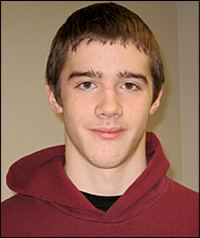
Am Fam Physician. 2008;77(6):782
One day I noticed that my neck was sore. I wasn't worried. As a wrestler, I'm used to pain during most of the wrestling season. It's a hard sport. Pain is just the price you pay for doing something you love. When I found a bump on the left side of my neck a day later, I figured it wasn't anything simple, like a pulled muscle. But I didn't panic.

The doctor checked me out and told me the lump was an enlarged lymph node. He found a bunch of swollen glands on both sides of my neck. The doctor thought I had mono, and a blood test that day proved it. I wasn't surprised. Mono was going around the high school. Still, I was pretty bummed. It meant I couldn't wrestle for maybe five weeks. I got real tired. It turned out to be a slow recovery process. At first, I couldn't do anything except rest as much as possible. After a while, I began riding the exercise bike. Even with mono, I did well in school this semester—all As and one B.
When I went back to see the doctor, he spent a lot of time talking about my spleen. How many kids know what a spleen does? Before mono, I had no clue. The doctor didn't want me to go back to wrestling yet. That was about the worst news he could give me. He explained that if my spleen was too big from mono, it could rupture if I was hit on my left side. I knew I'd be okay, but he was pretty stubborn about the whole thing. Of course, my mom and dad sided with him.
I had an ultrasound test of my spleen. It came back fine. My mom was worried about me wrestling again, but the doctor passed me. I won my first match back, but it was tough. Tougher than I thought it would be. I've lost some matches since then, but I'm not blaming mono. I'm just glad I'm over it.—c.s., 16
COMMENTARY
Allowing ill or injured student athletes to resume participation in sports can be a dilemma for physicians. Pressure from parents, coaches, and competitors to clear athletes to return to competition can make a physician's job difficult. Supportive coaches and understanding parents make a big difference. For an athlete recovering from mononucleosis, wrestling is a potentially dangerous sport. Before releasing C.S. back to practice and competition, ultrasonography of the spleen documented the absence of splenomegaly and provided peace of mind for his parents and physician. Young athletes tend to be quite resilient. A positive attitude goes a long way.